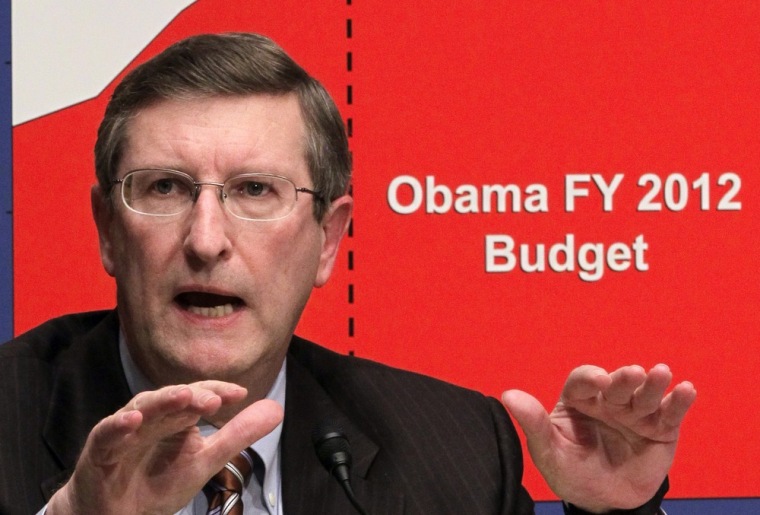They have met in almost total secrecy for months, holed up in an office on Capitol Hill: three Republican and three Democratic senators trying to hammer out a deal to reduce America's vast deficit.
Now, with the "Gang of Six" senators widely anticipated to deliver their proposal in early May, the air of expectation in Washington is acute.
Many believe their efforts represent the only real chance — and a slim one at that — of the U.S. Congress reaching a deficit-reduction deal before next year's elections. A sense of crisis over the $1.4 trillion deficit is gripping Wall Street and Washington, and it's weighing heavily on voters.
"It's the only bipartisan plan around," one Republican political strategist told Reuters, speaking on condition of anonymity because he did not want to be seen endorsing the proposal before it is released.
William Galston, a former domestic policy adviser to President Bill Clinton, said in the hyper-partisan environment of Washington, the Gang of Six could produce "a transformative moment."
The six senators — Democrats Mark Warner, Dick Durbin and Kent Conrad, and Republicans Tom Coburn, Saxby Chambliss and Mike Crapo — have met dozens of times since December. Their staff have devoted hundreds of hours to try and reach a deal.
What has marked them as a special group in Washington, a city famous for leaks and double-talk, is their commitment to keeping details of their discussions secret. This has given them a sense of trust in each other and a belief that they can negotiate in good faith.
The group is acting under no authority — the senators got together informally four months ago — yet they carry real heft. Not only are they trying to forge a rare bipartisan deal, they have gained respect by taking on the more extreme elements of their own parties.
Coburn, for example, has been a Republican anti-tax hawk but insists that raising revenues has to be part of a deficit-reduction package, something fiercely opposed by the Republican Tea Party caucus in the House of Representatives and many party rank-and-file.
Durbin, a Democratic liberal, concedes that major reform of entitlement programs such as Medicare and Medicaid, the government-run programs for the elderly and the poor, must be part of a deal. Fellow liberals insist that they remain largely untouched.
Where are the votes?
Whatever deal they strike, the far right and far left are sure to oppose. And that makes vote counting a critical and difficult piece of the group's effort.
The agreement, if any, that emerges will need to be bold enough to dent the deficit but bland enough to generate the kind of broad support that offers political cover both to the White House and members of Congress, almost all of whom face voters in 2012.
So, no matter how well intentioned and well regarded, the Gang of Six's ability to build a coalition around their deal is far from certain.
Conservative Republicans, including Tea Party members, are opposed to revenue increases, even if they come from closing tax loopholes, not raising tax rates — an approach the Gang of Six is close to endorsing.
Chris Van Hollen, the top Democrat on the House Budget Committee, told Reuters that a Gang of Six deal would give "momentum" to the deficit debate, but cautioned: "It's just too early to say. We still don't know how this will play out."
The big question, Van Hollen said, is whether enough House Republicans can defy the Tea Party caucus "and back the revenue increases" included in the Gang of Six plan.
House Speaker John Boehner's reversal Tuesday on oil companies' tax subsidies shows just how difficult any tax increase talk will be within his party.
Boehner will need 218 votes to pass any deficit-reduction bill. There are 50 Tea Party House members — and Boehner suffered 58 defections from his own party when the House passed a 2011 budget earlier this month, and that was a budget that included massive spending cuts wrested from Democrats.
Biden distraction
Amid the sometimes deafening debate on Capitol Hill over how to reduce the scale of debt, the Gang of Six have quietly, and civilly, strived to reach a cross-party deal.
Karl Rove, the former chief political adviser to President George W. Bush, said the six do not have to produce a detailed proposal, but as long as their overall deficit target is big enough, "they could bring people with them."
In the meantime, Republicans offered a deficit-reduction plan by congressman Paul Ryan that was soon followed by Obama's own proposal. While both envision reductions of roughly $4 trillion over the next decade, their prescriptions for how to meet that target are very different, only heightening divisions over how to bring down the deficit.
Pressure on the six senators to deliver a report as soon as next week has intensified in recent days, because a separate deficit-reduction panel led by Vice President Joe Biden, due to meet for the first time on May 5, is viewed by many on Capitol Hill as little more than political theater.
A U.S. Senate aide derided the Biden panel as "an entirely made-up thing."
